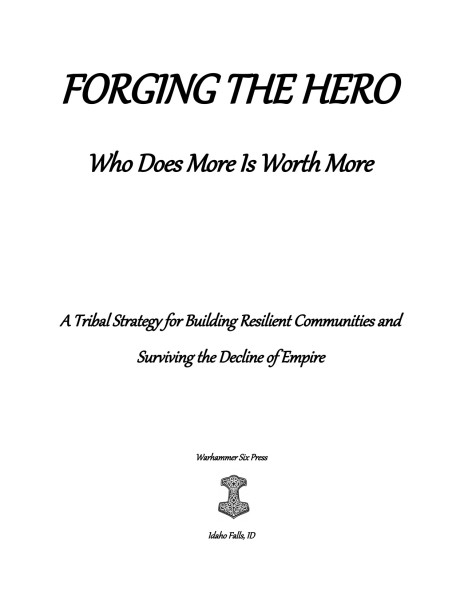
John Mosby sent me a pre-release copy of his latest book Forging the Hero to review. He asked me to write a blurb for his website. This is what I wrote:
“Mosby starts his book with a chapter called: “Shit Just Ain’t Right.” It’s a feeling that many of us share, but few are working to resolve. Mosby, on the other hand provides some realistic solutions in his book Forging the Hero. Fixing societal problems requires community building…developing one’s self, one’s family, and one’s tribe to provide stability in the face of future uncertain times. Mosby provides a roadmap to do just that. He describes a process to build individual resiliency and construct a supportive network of family and friends to help you weather the hard times ahead. Our future isn’t in joining endless numbers of unorganized Facebook “prepper” groups for support. Our future is determined by the real world support we can build in our communities. Forging the Hero gives us the best strategies to build a community network providing for individual growth, financial support, emergency preparedness, and common defense. Reading this book and embracing the ideas within is a way to move forward and prosper in times ahead when only people with a well-developed “tribe” will prevail.”
I think many of my readers will share my appreciation for reading material on this topic. Judging from the emails I receive, I know I have a lot of preppers and survivalists among my followers. Mosby’s new book will be of great interest to all of you. Unlike many prepper books, this one describes how to play the long game of survival.
I’ve traveled all over the world. I’ve spoken to people who have lived through economic collapses (Argentina), people who have lived through tyrannical governmental regimes (Cambodia), and everything in between. The real survivors of these crises aren’t the folks who bug out to a secret bunker in the mountains. Those folks eventually run out of supplies or get killed by roving gangs. The real survivors build community. They rely on family, friends, and neighbors for charity, common defense, and the sharing of labor. This is the concept Mosby is trying to teach in Forging the Hero.
For a detailed description of the contents of the book, check out Mosby’s article.
The book begins with an examination of the various empires which have existed in recent history, drawing heavily from the work Sir John Badget Glubb’s The Fate of Empires. Glubb’s reasearch show’s that the length of past historical empires ranged from 137 to approximately 250 years. At an age of 240 years, the American empire is nearing the end. Mosby provides some strategies to survive, even if our country as we currently know it doesn’t.
He starts with the idea of building the individual. “Who does more is worth more.” Providing advice for strengthening and hardening yourself at the individual level, Mosby calls the process “The Way of the Hero.” His advice is likely to shake up the preparedness community. From the book:
“If you are complaining about the demise of society, are your actions proving that you are dissatisfied? If you are complaining about something, but then you are acting out the same things whether out of ignorance, frustration, or lack of real motivation, it makes your complaints a lie.
If you claim you value a culture of strength, but no one has ever seen you do anything more physically exerting than eating an entire baker’s dozen of cream-filled, glazed donuts? Your conviction is a lie.
If you claim you value a culture of community, self-reliance and independence, but you can’t go help a neighbor move his couch because your favorite television show is on? Your conviction is a lie.
If you claim you are a combat marksman, and believe in the responsibility and right to bear arms for personal, family, and community defense, but you don’t carry your gun every single time you walk out of the house? Your conviction is a lie.
If your conviction is a lie, people are not going to pay attention to you. They’re not going to look to you for leadership, because you don’t embody the personification of your orlǫg. You’re a liar. You’re a fake, a fraud; a pretender to the throne of the tribal chieftain. You’re the Trickster. Fuck you.
The first step towards building a strong, resilient, surviving tribal identity is living the customs and values that you profess. I promise you, from the deepest depths of my experienced soul, if you begin living a life of leadership, by getting off your ass and living the values you lay claim to, people will begin paying attention to you. They will begin not only listening to what you say, but they will come to you, uninvited, and ask for guidance. It’s part of the human nature, and the natural hierarchy. It’s not a matter of the image; no one cares that you have eighteen sets of Crye Precision Multicam uniforms, and three complete sets of load-bearing equipment. If you’re a lazy fuck, who won’t get off the couch, you’re a fraud.
No one cares that you are a NRA-certified CCW instructor, if you don’t carry your gun, you’re a fraud.
No one cares that you have two years worth of food storage, if the only meal they see you eat are McDonald’s Extra Value Meals. You’re a fraud.
If you tell your children and the youth of your clan, that they need to get outside, away from the television and video games, but you lock yourself in the house all day, because you’re “old” and have “old injuries?” They’re not going to believe you. You’re a fraud.”
Furthermore, Mosby states:
“We must become the Hero. Not in the modern, vainglorious sense of some pampered, overpaid adolescent sports star or celebrity, but in the classical mold. We must become the person that people look to, when the dragon that is the primordial fear, is at the city’s gates, because they know that we long to slaughter dragons. We must accept the inheritance of the mythic history of our people. We must eschew the weak comfort of the mediocrity of egalitarianism and strive instead to be worthy of donning the arms and armor of responsibility once borne by Arminius and Arthur; we must pick up the shield and ax of Beowulf and Sigurd. We must become the inheritors of the aristocracy of the natural hierarchy of our tribes; we must become the “Cyning”—best of our kin—not by proclamation, but by acclamation. “
After the individual, comes the building of a tribe. He relies on ancient Germanic and Nordic customs and language to provide an historical framework of the way successful tribal life in our recent history existed. From the book:
“Ultimately, the goal of survival preparedness, if we use “I want to survive!” is a dead end. You are not going to survive. Whether that is in the long-term or the short-term is largely predicated on your ability to develop the types of strong tribal ties—frið—that allowed your ancestors to survive the decline of previous empires. Simply building a gang of fellow preppers may be adequate to ensure survival in the short-term, at least until someone comes along who offers more benefit to your friends-of-convenience. In order to survive for the long-term, you need to develop that level of frið among your kith-and-kin—or within the intentional tribe of a sodality. Even then however, you can only survive to the end of your natural lifespan. The continuation of your cultural values requires passing on those values to the next generations. That requires strong families, with children who are indoctrinated in the values of the clan’s ørlǫg.”
Mosby ends the books with chapters on family life, raising children, Forging the Heart, Forging the Shield, and Forging the Spear, each individual treatises about developing the psychological framework, defensive skills, and family support necessary to survive in uncertain times.
“By providing the example to your children, of how to live in accordance with those values, and by educating them with the skills and lessons of those values, you provide the greatest opportunity for not only their—and your—short-term survival, but also for the long-term survival of your culture. That requires, as in all other aspects of life, emigrating “outside” of the metaphorical borders of the decadent, dying imperial culture’s definition of “modern family values.”
Anyone truly interested in long term survival will buy this book and embrace the principles within. If any of you are a fan of Jack Donovan, I find that Mosby’s book meshes quite nicely with Donovan’s new book Becoming a Barbarian. Donovan provides the philosophical background for the withdrawal from contemporary society and the embracing of a “gang” or “tribe.” Mosby provides the practical skills to do it.
The book is not cheap. It costs $50 for a physical copy. Mosby is truly living the virtues he exclaims in his books. He eschews the ready popularity and cheap publishing costs of a giant like Amazon.com. Preferring anonymity (which can’t be done through Amazon), Mosby has truly gone the route of SELF publishing. Without the economies of scale of a behemoth like Amazon, these are the costs of writing, printing, and shipping a quality piece of literature. Even at twice the price of your average fictional hardcover, this book is worth the money.
I think you all will truly enjoy it.
You can buy it at Lulu.com.
FTC disclaimer: Neither the author or publisher have provided any compensation for this review. I was provided a free electronic review copy, but I am not receiving any compensation for the review or sale of this book. It is a quality piece of literature and I am happy to introduce it to my readers without compensation.
